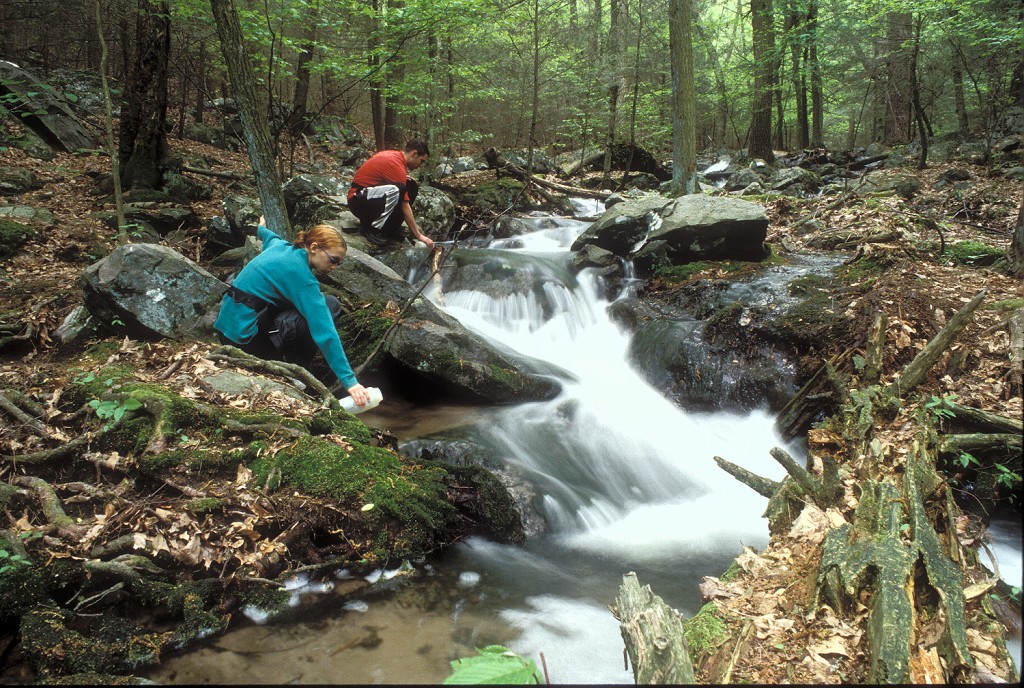Outward Bound courses do more than teach students how to survive in the wild; they teach them how to thrive – on their course and in their lives. They expose students to the thrills of our natural world – and show them how to enjoy these extreme places in a safe, responsible manner. In addition to building character, leadership and teamwork, these expeditions provide students with the skills they’ll need to succeed in the classroom, workplace, with their families and in their communities.
At the beginning of every expedition, Outward Bound students receive detailed instruction on risk management and wilderness skills, so that as the course progresses they can take on more responsibility – and put their skills to the test. By the end of an Outward Bound expedition, students have firsthand experience in wilderness travel – and feel ready to tackle the obstacles that arise – both in nature and in life.
Below, we’ve assembled 12 crucial survival skills for life that students learn on an expedition with Outward Bound.
Start With a Good Plan
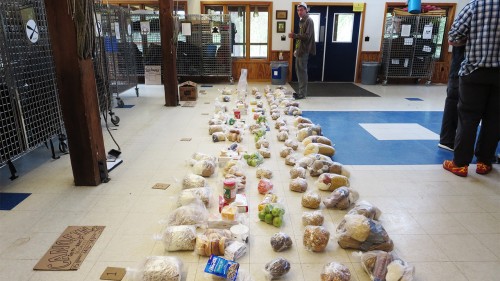
Instructors prepare food to be packed and brought on course. Photo by Jack Hillbrich
Outward Bound Instructors spend a good deal of time at the beginning of every expedition familiarizing the crew with fundamental risk management strategies. Before they head out into the wilderness, an Outward Bound crew learns to anticipate potential challenges, and plan for them accordingly. This means packing the appropriate amount of food, ensuring that every crew member has the right gear, and verifying what other supplies the group will need. But more than bringing the right stuff, students learn to assess interpersonal and intrapersonal qualities, consider group dynamics, and evaluate physical and emotional abilities. By starting out with a well thought-out plan, Outward Bound crews mitigate risk – and avoid situations where “wilderness survival” becomes necessary.
Respect the Environment – Leave No Trace
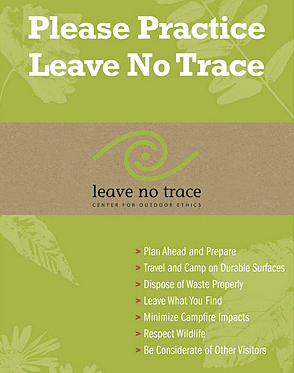
The Seven Leave No Trace Principles
On every Outward Bound expedition, the crew adheres to Leave No Trace principles – guidelines that help groups and individuals enjoy the wilderness in a responsible manner. Leave No Trace principles help minimize human damage to the environment – and ensure that the wilderness is left in its original, pristine condition for the next visitor to enjoy.
Select a Good Campsite
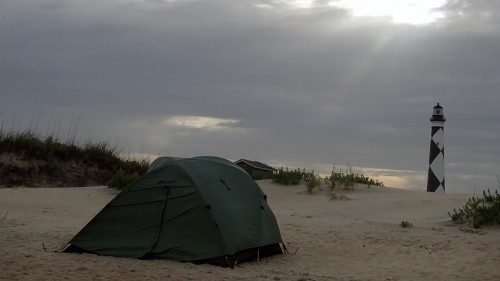
Campsite location in the Outer Banks of North Carolina.
While traveling through the wilderness, groups have the unique opportunity to choose their home – deliberately and intentionally – each night. A good campsite can mean the difference between a wet, cold night and a warm, dry rest. Besides searching for a low-impact site that provides access to natural resources, your group will also look for safety and comfort. A flat campsite is important to avoid water flowing down into the sleeping area – but also to avoid group members rolling into one another. The group must also be aware of large tree branches that may fall on them during the night – and be on the lookout for other natural hazards. Or, in other words – location, location, location!
Build Shelter
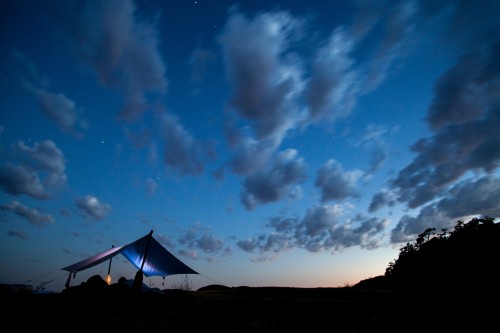
Kayaking tarp setup during a Northwest Sea Kayaking & Alpine Backpacking course in Washington. Photo by Joel Reid
Depending on the course area and expedition style, Outward Bound students use either tarps or tents as shelter each night. First things first, students learn to effectively assemble their shelter. This means setting up taut lines and strong stakes, tying good knots and orienting sleeping bags and sleeping pads appropriately – with heads uphill. When shelters are set up correctly, they do a good job of keeping the elements out – and keeping the people inside dry and warm. Once the shelters are set up, the group takes good care of their new “homes.” In particularly buggy areas, the students learn to keep tents zipped at all times – lest the mosquitoes enjoy an all-night buffet. Students also learn to store food away from shelters – as critters will try to get to the food – and may even chew through tarps or tents to do so. Your new “home away from home” can really be quite cozy. Plus, you can’t beat the view!
Find Water – Make it Safe to Drink
In course areas where there is no potable water, the group will often pack water with them for the duration of the expedition. But in most areas, groups work together to identify water sources ahead of time. Armed with maps and course area guides, they note which streams and water sources are safe and accessible. It is important for the group to think about how seasons and weather systems might affect water sources, as well. Will the stream be dry, barely trickling, or rushing? Students carry iodine or bleach with them – and learn exactly how to use them – and in what ratios – to ensure water is safe to drink.
Cook Food
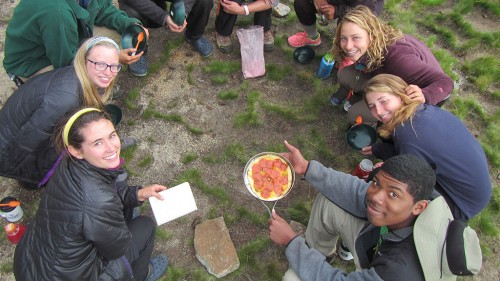
Students practice their campsite culinary skills.
Students on Outward Bound expeditions move their bodies for more than eight hours a day – whether they are paddling, hiking or climbing. Because wilderness travel places such physical demands on its participants, nutrition is a crucial concern. Each individual must get an adequate balance of fats, proteins and carbohydrates as they burn through fuel every day. Besides providing crucial calories and nutrients for the group, eating and preparing food on course can be a bonding experience and morale builder. Careful planning ensures that the group has the right amount of food – and a good menu ensures that each meal is tasty team endeavor. Outward Bound crews usually cook over a small, fuel-based camp stove – and students are often surprised at how good food can taste in the wilderness. That’s right – foodies welcome!
Learn to Navigate
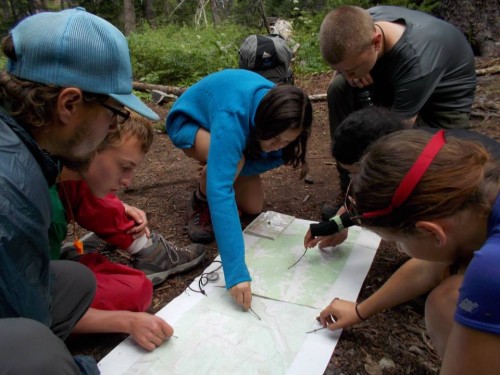
Students learning to navigate on course with maps.
Each Outward Bound course area has its own maps – and some even have their own types of maps. Sailing courses, for example, use sailing charts to help guide crews from point A to Z. From the beginning of the expedition, students practice using compasses and reading maps to ensure they know where they are, where they’re going, and how to get there. Oftentimes the group uses man-made features as points of reference, and also relies on local area knowledge. Students are pleasantly surprised at how well they are able to use these tools to make their own way – and are proud of their new skills. All without a smart phone!
Stay Warm
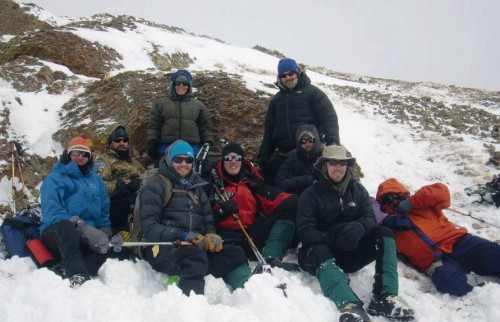
Students dress warm during their winter expedition in the Colorado Rockies. Photo by Bob Wojtalik
Before the group sets off into the wilderness, students learn about the importance of using layers for warmth and Instructors check to make sure everyone has the proper gear. But more than just layers, students learn strategies to stay warm. Eating enough calories and staying well-hydrated keeps the metabolism going, and keeps bodies warm. Movement is also an important factor. The more the bodies are moving, the more the blood is flowing, and the warmer the individual remains. When it comes time for sleeping, students put sleeping mats below their sleeping bags – and arrange their sleeping bags so they are wafted for maximum insulating power. Students are careful to enter their sleeping bags in warm, dry clothing – and avoid bringing anything damp into bed with them. After all, a sleeping bag is a bit like a thermos; if you put something cold in it, it remains cold. But if you put something warm in it, it remains toasty. Yep – this might mean a late-night dance party is in order just before bed.
Stay Clean
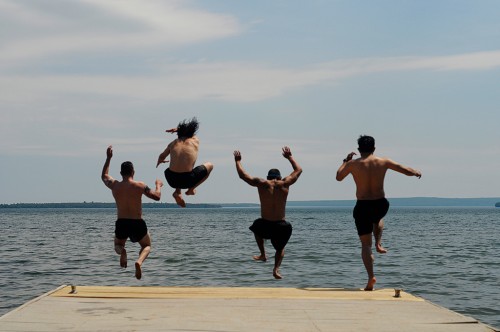
Students jump into the Boundary Waters for a natural bath. Photo by Chad Spangler
On an Outward Bound expedition, the focus is not necessarily on cleanliness, but rather on good hygiene. Good hygiene keeps food safe, prevents bug bites from getting infected, and keeps the group healthy. Students wash hands after they’ve gone to the bathroom and before they eat. Though hand sanitizer or baby wipes can be used for some situations, students use soap and water several times a day. They also learn to rinse their body under a bucket of water dumped over their head, and on a warm day, they may rinse a t-shirt out in a river and allow it to dry. Best of all… students often get the chance to take a natural bath in a natural water source. There’s nothing like a good, old-fashioned exfoliating scrub with rocks and sand.
Be Proactive

Crew members prepared and in sync during a backpacking course.
In the wilderness, it is important to catch warning signs before they turn into problems. Students learn to be aware of themselves – and also to recognize changing behavior in the group. A hot spot on a heel can easily be remedied before it turns into a blister, and the sooner crew members articulate their discomfort, the better. Similarly, if a student suddenly goes from enthusiastic to withdrawn, it’s up to the group to assess what is going on – and address it. One of the great things about an Outward Bound course is that crewmates get the chance to truly bond– and truly support each other. Students are often amazed at how well their crew members know them at the end of the expedition – and how well they know the habits and idiosyncrasies of their fellow crew members.
Get in touch with your inner child.
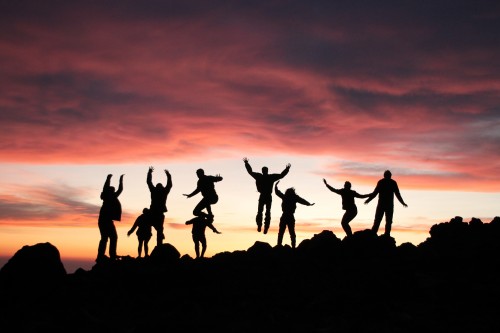
Students let loose in front of a picturesque sunset. Photo by Ali Rose
The enormity of the wild – with its towering pine trees, monumental mountains, and expanses of rippling water – has the power to make even the biggest among us feel quite small. Below a huge sky of twinkling stars, you might realize how big the world really is – and how much possibility it holds for you. The woods, oceans, mountains and rivers tap into our imagination. They kindle a sense of wonder and amazement – and a childlike playfulness. A game of hokey pokey around the campfire? Sure! A mudbath facial? Yes, please! This is your chance to play in the dirt. To laugh at yourself. And, free of the tapping of tiny keys, your chance to be present – truly present – in the midst of real people, real landscapes, and real beauty. Now that’s what we call a survival skill!
Work As a Team
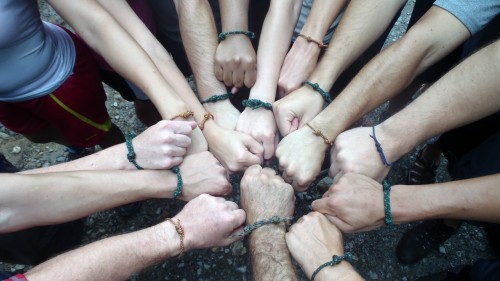
Long-lasting bonds are formed through teamwork on every Outward Bound course.
Most important of all, students learn to work as a team. As the crew gets to know one another, they also learn that one person’s weakness might be another’s strength – and vice versa. The expert knot-tier may take time to tutor someone who is learning to tie knots for the first time. The strongest hiker might volunteer to carry extra weight, and the most energetic member might accompany a student who is struggling one afternoon. At the end of the day, even when the group is tired, students learn how to encourage one another; how to communicate in a positive, productive way; how to share successes big and small – and how to find the silver lining in every situation. Students quickly realize that that the whole is greater than the sum of its parts – and they can achieve much more (and have a lot more fun) together than on their own. Armed with transferrable life skills, they return home better teammates, better leaders, and better citizens.
In conclusion, we’d like to remind you that these 12 survival skills for life apply to everyone. That’s right – no matter the age, place, or disposition, the skills learned on an Outward Bound course will take you far; whether it’s in the classroom, workplace, at home, or in your community.
We’ve just given you 12 good reasons to get enrolled for an Outward Bound expedition. So what are you waiting for? Get on your adventure already!
Go to www.outwardbound.org or call 866.467.7651 to speak with an Admissions Advisor about the course that’s right for you.



